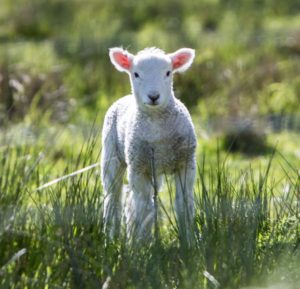
So what do Easter egg hunts and bunnies have to do with Easter? Well nothing actually! Even the name of the holiday “Easter” has non-biblical origins. One way to explain the real meaning of what we celebrate on Easter is in the context of the biblical Old Testament account of God’s deliverance and redemption of His special, chosen people, the Israelites, or the Jewish people, in the holiday known as the Passover.
As recorded in the book of Exodus, over 3,500 years ago, the Israelites spent 430 years living in Egypt as slaves. In order to deliver His people from this bondage, God sent His prophet Moses to unleash a series of plagues upon the Egyptians. The final of these plagues involved sending the angel of death to kill every first born son of all families in Egypt. For the Israelites, God provided a way to spare them by sacrificing a spotless male lamb which would in effect die in place of their first born sons. The lamb’s blood was then to be placed over the door posts of each home so that the angel of death would “pass over” that home, thus inaugurating the first Passover event.
From that first day of deliverance onward, God established a covenant with the Israelites through a set of His holy and righteous laws, which included the 10 Commandments. Because God already knew that His people would fall short of these laws, He also provided a means by which they could make atonement, or make payment, for their sins. This involved a complex system of animal sacrifices that would be made by the Jewish priests in the Tabernacle and later Jerusalem Temples, where the animals would in effect die on behalf of the people. The pouring out of the blood of these animals was also important since it was the blood that represented the life of the creature. (Genesis 9:4-6, Leviticus 17:11)
Through His prophets, God foretold of a day when animal sacrifices would no longer be needed. Through Isaiah, God announced His plans to send His Servant to suffer and die on behalf of His people in order to pay for all their transgressions (Isaiah 53). Through Jeremiah, God said that He would one day make a New Covenant with His people and with all peoples where His Laws would be written on their hearts (Isaiah 42:1-9, Jeremiah 31:31-34).
On the night before his death, Jesus celebrated the Passover feast in Jerusalem with His twelve disciples. There Jesus pointed to his own body as the fulfillment of the many elements of the Passover meal. He said the broken matzah bread was like his body, and that the wine was like his blood to be poured out for them. Jesus also announced the beginning of the New Covenant inaugurated through the pouring out of his blood. (Isaiah 52:13-15, Luke 22:14-20)
The next day, Jesus was crucified on the cross. His blood was poured out and His body sacrificed, just like the Passover lamb. Because Jesus was God’s very own Son, His blood was holy and served as payment for the sins of both the Jews and now all of humanity, providing the only true and lasting way to be reconciled with our Holy Creator God. Just as the Israelites were freed from their bondage to slavery by the Passover lamb, anyone today can be set free from their slavery to sin and death by the blood of Jesus, the Lamb of God. (John 1:29, 1 Peter 1:18-19, Ephesians 2:12-13, Hebrews 9-10)
And here’s the really good news! Three days after his death, God resurrected, or brought back to life, His Son Jesus! Because Jesus did not stay in the grave, we can now have a living hope of a great High Priest named Jesus to pay for the forgiveness of our sins and to have a real relationship and eternal peace with our Creator God to all who come to Him and ask!
